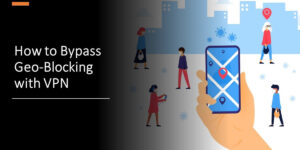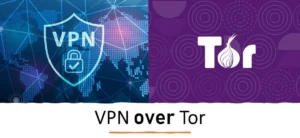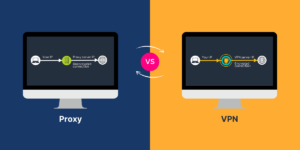The Battle for Online Security: VPN vs. Antivirus
When comparing VPN vs. antivirus, it’s essential to understand the key differences and the unique benefits they offer. While both technologies play crucial roles in protecting your online security and privacy, they serve distinct purposes.
Both VPNs and antivirus software contribute to online security; they excel in different areas. VPNs prioritize privacy, anonymity, and secure internet connections, making them invaluable for activities like online banking, streaming, or accessing restricted websites. In contrast, antivirus software focuses on identifying and removing malware to prevent infections and safeguard your personal data on your devices.
VPN: Virtual Private Network
A Virtual Private Network (VPN) is a service that establishes an encrypted & anonymous connection between a user’s device & the server of the website/service. Creating a virtual tunnel enables users to transmit and receive data over public networks as if their devices were directly connected to a private network. The VPN acts as an intermediary, employing encryption techniques to protect the data in transit and ensuring anonymity by obfuscating the user’s IP address.
Benefits of VPN
- Privacy and anonymity: VPNs create a secure tunnel that encrypts data, making it difficult for anyone to intercept or track online activities. It protects users’ privacy & allows them to browse the internet anonymously.
- Enhanced security on public Wi-Fi: When connected to a public Wi-Fi network, such as those found in cafes or airports, VPNs encrypt all data transmitted between the user’s device & the internet. It prevents malicious actors from intercepting sensitive information like password/credit card details.
- Access to geographically restricted content: VPNs allow users to bypass geo-blocking and access content that may be restricted or unavailable in their current location. By connecting to a server in a different country, users can appear as if they are browsing from that location, granting them access to region-restricted websites and services.
- Protection against surveillance and hacking: VPNs create an additional layer of security, shielding users from surveillance and potential hacking attempts. By encrypting data and masking the IP address, VPNs make it challenging for anyone to monitor or target specific users.
What Is an Antivirus?
Antivirus software is a specialized program designed to protect computer systems & devices from malicious software, commonly known as malware. It operates by employing a combination of techniques to detect, prevent, & eliminate different types of malwares, including viruses, worms, Trojans, adware, and spyware. Antivirus programs use signature-based detection, where they compare files and programs against a database of known malware signatures.
Additionally, they utilize heuristic analysis, which involves analyzing the behavior and characteristics of suspicious files to identify potential threats. Antivirus software also includes real-time scanning, where it continuously monitors system activity to detect and block any malicious activity. It plays a critical role in safeguarding the integrity and security of computer systems by proactively combating malware and preventing potential damage or unauthorized access to sensitive data.
Benefits of Antivirus
- Detection and removal of malware: Antivirus software scans files and programs on a user’s device, searching for known malware signatures or suspicious behaviors. When malware is identified, the antivirus software removes or neutralizes the threat.
- Real-time protection: Modern antivirus solutions provide real-time protection by continuously monitoring system activities and incoming data. This proactive approach helps detect and block emerging threats in real time, minimizing the risk of infection.
- Safe browsing experience: Antivirus software often includes features that protect users while browsing the internet. It can block malicious websites, warn against potential phishing attempts, and offer browser extensions that provide additional security layers.
- Email and file scanning: Antivirus software scans incoming and outgoing emails, attachments, and files, ensuring that malicious content does not infiltrate the user’s device through these channels. This helps prevent the spread of malware through email attachments or infected files.
VPN vs. Antivirus: Why You Should Use Both
While VPNs and antivirus software share the goal of enhancing online security, they differ in several key aspects:
| Features | VPN | Antivirus |
|---|---|---|
| Security | Encrypts internet traffic, protecting data from eavesdropping. | Detects and removes malware, viruses, and other malicious software. |
| Privacy | Masks your IP address, making it difficult to trace your online activities. | Protects personal information from unauthorized access. |
| Anonymity | Allows you to browse the internet anonymously by hiding your identity. | Does not provide anonymity, but secures your device and data. |
| Data Encryption | Encrypts data transmitted over the network, ensuring confidentiality. | Does not encrypt data, but protects against malware threats. |
| Geo-spoofing | Bypasses geographic restrictions, allowing access to region-locked content. | Does not provide geo-spoofing capabilities. |
| Remote Access | Enables secure remote access to private networks or systems. | Does not provide remote access functionality. |
| Network Security | Protects your device and data from potential network threats. | Focuses on scanning and removing threats from your device. |
| IP Masking | Changes your IP address, making it appear as if you’re browsing from a different location. | Does not alter your IP address. |
| Wi-Fi Security | Secures your connection on public Wi-Fi networks, protecting against hackers. | Does not directly protect Wi-Fi connections, but scans for malware threats. |
| Content Filtering | Can bypass content filters and censorship imposed by certain countries or networks. | Does not provide content filtering capabilities. |
| Torrenting Support | Allows for secure and anonymous torrenting or file sharing. | Does not directly support or facilitate torrenting. |
| Multiple Device Support | Can be used on multiple devices simultaneously, depending on the subscription. | Can be installed on multiple devices to protect against malware. |
| Speed and Performance | Can affect internet speed due to encryption and routing of traffic. | Generally has a minimal impact on device performance. |
| Price | Comes with subscription-based pricing, with various plans available. | Comes with subscription-based pricing, with various plans available. |
| Compatibility | Supports a wide range of devices and operating systems. | Supports a wide range of devices and operating systems. |
How VPN Differ from Antivirus?
While VPNs and antivirus software share the goal of enhancing online security, they differ in several key aspects:
- Purpose and functionality: Trusted VPNs like NordVPN or Surfshark VPN primarily focus on securing internet connections and protecting users’ privacy and anonymity. Antivirus software, on the other hand, is specifically designed to detect, prevent, and remove malware from devices.
- Scope of protection: VPNs protect users by encrypting data and securing internet connections, making it difficult for malicious actors to intercept or monitor online activities. They safeguard privacy, protect against surveillance, and grant access to geo-restricted content. Antivirus software, on the other hand, focuses on detecting and eliminating malware threats that can infect a user’s device, compromise data, or disrupt system functionality.
- Types of threats addressed: VPNs primarily protect against data privacy and security threats during online activities. They safeguard against data interception, unauthorized access, and surveillance. Antivirus software, on the other hand, specializes in identifying and neutralizing various types of malware, including viruses, worms, Trojans, ransomware, and spyware.
- Impact on Internet connection: When using a VPN, the encrypted connection may slightly affect internet speed due to the additional processing required for encryption and decryption. However, the impact is generally minimal, and many VPN services offer high-speed connections. Antivirus software operates in the background, scanning files and processes without significantly impacting internet speed unless a full system scan is initiated.
When to Use VPN and Antivirus
The decision to use a VPN or antivirus software depends on specific scenarios and security requirements:
In Which Situation VPN is Beneficial
- Public Wi-Fi Networks: When connecting to public Wi-Fi networks, such as those in coffee shops, airports, or hotels, using a VPN is highly recommended. It ensures that your data remains encrypted and protected from potential eavesdropping or interception by cybercriminals.
- Accessing Geo-Restricted Content: Utilizing a Virtual Private Network (VPN) facilitates accessing region-restricted content or services by enabling connection to servers located in the desired regions. This establishes a virtual presence in the chosen location, effectively bypassing geographical limitations and granting unrestricted access to previously restricted content or services.
- Anonymity and Privacy Concerns: For individuals prioritizing privacy and anonymity, particularly in scenarios involving sensitive information access, private communication, or circumvention of government surveillance, employing a Virtual Private Network (VPN) offers an additional level of safeguarding. This is achieved by obfuscating the user’s IP address, thereby concealing their true identity, and encrypting their data, ensuring its confidentiality and integrity during transmission.
In Which Situation Antivirus Software is Necessary
- Protection against malware: Antivirus software is essential for protecting your device from malware threats. This includes scanning files, programs, and emails for potential threats and providing real-time protection against emerging malware.
- Safe browsing and email protection: Antivirus software offers website blocking and email scanning features to protect against phishing attempts, malicious websites, and infected attachments. It helps ensure a safer online experience by detecting and blocking potential threats.
The Synergy between VPN and Antivirus
While VPNs and antivirus software serve different purposes, they can complement each other to strengthen overall online security:
- Privacy and security: When used together, a VPN and antivirus software create a comprehensive security solution. A VPN protects your online activities, encrypts your data, and masks your IP address, while antivirus software detects and removes malware threats that may infiltrate your device.
- Secure browsing: A VPN encrypts your internet traffic, protecting it from prying eyes. Antivirus software provides additional security layers by blocking malicious websites and warning against potential threats, ensuring a safer browsing experience.
Final Thoughts
In summary of VPN vs. Antivirus, VPNs and antivirus software bolster online security, albeit with distinct purposes and functionalities. VPNs primarily concentrate on fortifying internet connections, preserving privacy, and enabling access to geo-restricted content. Conversely, antivirus software is specialized in identifying and eradicating malware threats. Each tool offers unique advantages and should be employed based on specific security needs. By comprehending the disparities between VPNs and antivirus software, users can make informed choices to safeguard their digital presence and foster a safer online environment.

 Verified A Professional Content Writer
Verified A Professional Content Writer
Riha Mervana is a professional content writer at SearchVPN.org, with extensive experience crafting engaging and informative content. She has established herself as an expert in the VPN industry, creating content that educates readers on the importance of online privacy and security.


